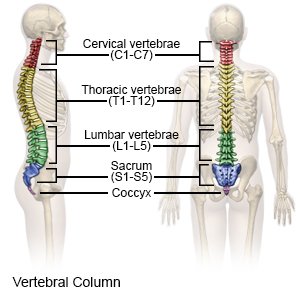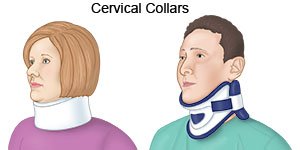Spasmodic Torticollis
Medically reviewed by Drugs.com. Last updated on Apr 6, 2025.
Spasmodic torticollis is a condition that causes your neck muscles to contract (shorten and tighten). Your neck twists suddenly and causes your head to tilt or turn without control. You may have trouble moving your neck. You may also have headaches, neck pain, or shoulder pain. Your neck muscles may have spasms, stiffness, or swelling. Symptoms often gets worse with stress, sudden movement, or muscle strain. Spasmodic torticollis is also called cervical dystonia.
 |
DISCHARGE INSTRUCTIONS:
Call your local emergency number (911 in the US) if:
- You have sudden shortness of breath.
- You have trouble moving your arms or legs.
- Your arms or legs feel numb.
Seek care immediately if:
- You have increased pain in your neck or shoulder.
Call your doctor or neurologist if:
- You have a fever.
- You have swelling in your neck area that gets worse or does not go away.
- You have questions or concerns about your condition or care.
Medicines:
You may need any of the following:
- Muscle relaxers decrease pain and muscle spasms.
- Botulinum toxin injections may be given to relax your muscles.
- NSAIDs , such as ibuprofen, help decrease swelling, pain, and fever. This medicine is available with or without a doctor's order. NSAIDs can cause stomach bleeding or kidney problems in certain people. If you take blood thinner medicine, always ask if NSAIDs are safe for you. Always read the medicine label and follow directions. Do not give these medicines to children younger than 6 months without direction from a healthcare provider.
- Acetaminophen decreases pain and fever. It is available without a doctor's order. Ask how much to take and how often to take it. Follow directions. Read the labels of all other medicines you are using to see if they also contain acetaminophen, or ask your doctor or pharmacist. Acetaminophen can cause liver damage if not taken correctly.
- Prescription pain medicine may be given. Ask your healthcare provider how to take this medicine safely. Some prescription pain medicines contain acetaminophen. Do not take other medicines that contain acetaminophen without talking to your healthcare provider. Too much acetaminophen may cause liver damage. Prescription pain medicine may cause constipation. Ask your healthcare provider how to prevent or treat constipation.
- Take your medicine as directed. Contact your healthcare provider if you think your medicine is not helping or if you have side effects. Tell your provider if you are allergic to any medicine. Keep a list of the medicines, vitamins, and herbs you take. Include the amounts, and when and why you take them. Bring the list or the pill bottles to follow-up visits. Carry your medicine list with you in case of an emergency.
Treatment options
The following list of medications are related to or used in the treatment of this condition.
Self-care:
- Rest as needed. Return to your daily activities as directed.
- Apply ice to decrease swelling and pain. Apply ice on your neck for 15 to 20 minutes every hour or as directed. Use an ice pack, or put crushed ice in a plastic bag. Cover the bag with a towel before you apply it. Apply ice for as many days as directed.
- Apply heat to decrease pain and muscle spasms. Apply heat on your neck for 20 to 30 minutes every 2 hours, or as directed. Use a heat pack or a heating pad set on low. Apply heat for as many days as directed.
- Wear a cervical collar as directed. A cervical collar helps support your neck.

Follow up with your doctor or neurologist as directed:
Write down your questions so you remember to ask them during your visits.
© Copyright Merative 2025 Information is for End User's use only and may not be sold, redistributed or otherwise used for commercial purposes.
The above information is an educational aid only. It is not intended as medical advice for individual conditions or treatments. Talk to your doctor, nurse or pharmacist before following any medical regimen to see if it is safe and effective for you.
Learn more about Spasmodic Torticollis
Treatment options
Care guides
Further information
Always consult your healthcare provider to ensure the information displayed on this page applies to your personal circumstances.
